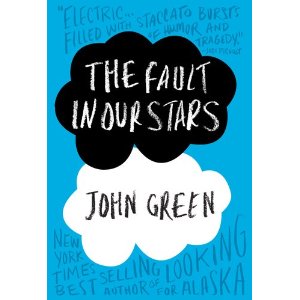Summer book reviews
 Linda Ge,
HUB Staff Writer–
Linda Ge,
HUB Staff Writer–
As the school year is coming to a close, DHS students can let out a sigh as they anticipate making room for activities that they had to go without: relaxing, traveling, and reading. Here are some popular, gender-neutral titles that The HUB recommends for flipping through, poolside and beyond.
The Fault in Our Stars (Dutton Juvenile): The much-anticipated book by John Green has hit shelves, and it does not disappoint. The title itself is an illusion to Shakespeare’s ‘Julius Caesar’: “The fault, dear Brutus, is not in our stars/But it ourselves, that we are underlings.”
Hazel is a teenage girl and terminal thyroid cancer patient who needs an oxygen tank to breathe. Augustus Waters is the amputee she meets at Cancer Kid Support Group—and later falls in love with.
The merit in TFiOS lies not in the fact that it is a “cancer book”, but because it is a poignant, heartfelt book about two teenagers who are trying to grow up in the midst of grim forecasts. “Cancer books suck,” Hazel says at one point, and neither she nor John Green lets ‘Stars’ become a weepy young adult novel. A refreshingly-strong female main character, Hazel does not allow the prospect of death determine the way she decides to live her remaining life.
Released around the same time as The Probability of Miracles’ by Wendy Wunder, ‘Stars’ is the more down-to-earth book of the two “cancer books.” ‘Miracles’ promises purple dandelions and everlasting sunsets, while TFiOS tones down the saccharine. Additionally, ‘Stars’ itself is more skillfully-written than ‘Miracles’: Green makes the most out of sentence rhythms and philosophical ideas that older readers may appreciate, while simple ideas and unsophisticated sentences make ‘Miracles’ appeal more to teenyboppers.
Though it is categorized as a Young Adult book, ‘Stars’ is mature enough that adults will enjoy its message too. Poignant and inspiring, it will make both female and male readers laugh, cry, and realize that feeling helpless is a choice. ‘Stars’ sends the message that it is never too late to try and change your stars.
I Am The Messenger (Knopf BfYR): Set in Australia, Printz Award-winning ‘I Am The Messenger’ centers around a taxicab-driving schmuck who can never get a break. Nineteen-year-old Ed Kennedy still gets bossed around by his verbally-abusive, foul-mouthed mom; lives alone with his useless old dog, loves Audrey who will never love him back, and doesn’t know where his life is headed. That all changes when he becomes the unwitting hero of a bank robbery. Ed starts getting addresses in the mail. He visits the people who live at these addresses and soon finds himself improving their lives. Along the way, he rethinks how he lives his own life and ends up becoming a better person.
‘Messenger’ draws the reader in with a thoughtful plot, and keeps him/her drinking in the words with beautifully poetic insights: “You can kill a man with those words,” Ed Kennedy muses at one point. “No gun. No bullets. Just words and a girl.”
All of Zusak’s books employ careful syntax, which would be beneficial to an incoming senior looking to write better essays in AP Comp/Lit. ‘The Book Thief’, another Printz Award winner by Zusak, is a YA book set in Nazi Germany and narrated by Death himself. ‘Getting the Girl’, a novella, chronicles a boy who wants out of his older brother’s shadow…and a girlfriend. While these other works all stand as works of literary merit, the voices in each are refreshingly-different, which points to Zusak’s versatility as a writer. However, ‘The Book Thief’ and ‘Getting The Girl’ may not resonate with all readers. ‘Messenger’, by contrast, has a nearly-universal message: Anyone can be a hero. Anyone.
The Perks of Being A Wallflower (MTV Pocket): While a movie version with Logan Lerman and Emma Watson is coming out, ‘The Perks of Being A Wallflower’ is still worth reading. First published in 1999, ‘Perks’ and its socially-awkward main character, Charlie, held the hands of a generation of jaded teenagers through high school. Charlie, an emotional young hipster, muses on controversial issues like weed, sex and sexuality as he tags along with a group of other young hipsters. ‘Perks’ is written in epistolary form, and makes countless cultural allusions to the 1990s (for example, Charlie recounts the airing of the last episode of M*A*S*H). Nevertheless, it remains relevant in the way that ‘The Catcher In The Rye’ by J.D. Salinger is still widely-read. ‘Perks’ has been named the ‘Catcher’ of its generation, but several differences exist between ‘Catcher’ and ‘Perks.’ For one, ‘Catcher’ was never intended as a bildungsroman, while ‘Perks’ finds the main character growing up at the end. While Charlie is just as sensitive as Holden Caulfield, if not more, he does not share Holden’s pessimistic, cynical view on life; instead, Charlie always tries to see the good in everyone.
Perhaps the most-quoted line in ‘Perks’ is “In that moment, I swear we were infinite.” And that may account for its enduring success: youth is perpetually spent journeying to experience those moments in which one feels truly alive and endless.



